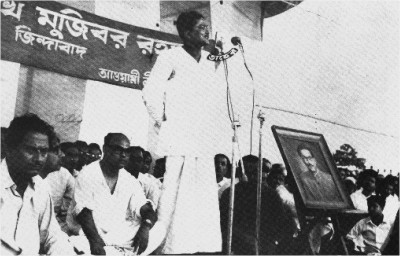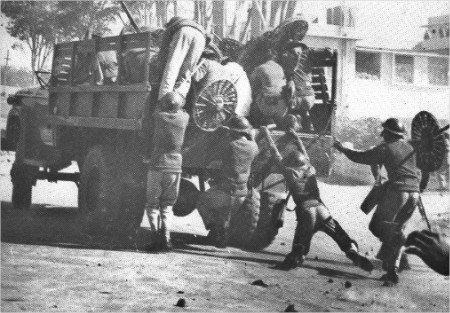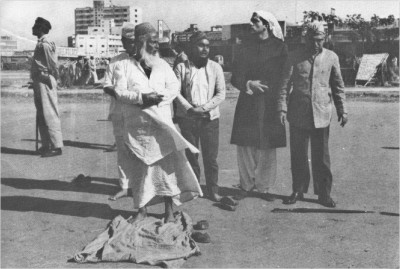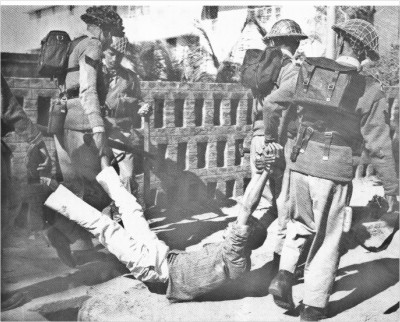
Inside
|
February 1969: Syed Badrul Ahsan celebrates the anniversary of the withdrawal of the notorious case that was a catalyzing moment in the transformation of a man and a movement into an unstoppable force for national liberation
The premeditated killing of Zahurul Haq, for so it was, was a clear hint of the desperation that the regime of President Ayub Khan had fallen into became of the gathering mass movement against the government in East Pakistan. In the preceding three months especially, public outcry against a trial that was beginning to be considered more of a sham than a true legal exercise had gathered pace. Indeed, the first real stirrings of discontent in Pakistan's eastern province, insofar as the Ayub regime was concerned, had been observed a month earlier through the killing of a young student, Asaduzzaman, on January 20. Four days later, the province erupted in unprecedented agitation. At Dhaka University and other campuses around the province, students deserted the classroom in droves and simply marched out on to the streets. The demand that Ayub Khan resign and that his underlings in East Pakistan, personified by the likes of Governor Abdul Monem Khan, quit office began to acquire the shape and form of a popular revolution in the making. By the time January gave way to February, the options before the government had clearly become limited. On the one hand, the students of Dhaka University, as well as those of other universities across the province, had come to adopt what was in Pakistan's brief history a radical program, alongside the Six Point Program first enunciated by the imprisoned Sheikh Mujibur Rahman in February 1966. The students called it their eleven-point charter of political demands. On the other hand, the fiery and widely respected Moulana Abdul Hamid Khan Bhashani, having overcome his brief flirtation with Ayub Khan in the early 1960s, had taken a decisive step in garnering popular support for a movement to have Sheikh Mujibur Rahman and his co-accused in the Agartala Case freed without any conditions attached. Additionally, the efforts made by Oli Ahad and Amena Begum, among others, to compel the regime into withdrawing the case, increased the government's worries. Thirty-eight years after what has come to be known in Bangladesh's history as a mass upsurge against an entrenched military regime, it makes sense to go back in time and reflect on the defining role the Agartala Conspiracy Case played in the shaping of the Bengali struggle to free themselves of Pakistan. There has always remained the suspicion, a pretty credible one, that the case had been cooked up by Ayub Khan and his Rawalpindi-based government as a means of liquidating Sheikh Mujibur Rahman and his rising Bengali nationalistic politics in what was regarded as a pure Islamic state for the Muslims of the subcontinent. In fact, as the campaign for the 1970 general elections got under-way, Khan Abdus Sabur Khan, a Bengali who had loyally served Ayub as central minister for communications and was leader of the Convention Muslim League in the National Assembly, told the country that he and a few others had advised the president against instituting the case because it could boomerang on the regime.And boomerang it did. What has eventually emerged in the nearly four decades since the case was dropped is that Mujib was certainly aiming at the independence of East Pakistan, that it was his objective to take the Bengalis out of Pakistan and create a separate, secular, and democratic state. A very early sign of Mujib's dream of Bengali freedom remains his question to Husseyn Shaheed Suhrawardy, back in 1957, regarding the feasibility of political sovereignty for East Pakistan. At the time, Suhrawardy (and he was prime minister of Pakistan) firmly put him in his place. But what has never been in doubt about the Agartala Case, though, is the ugly and rather uncouth way in which the Ayub regime went about building the case.
When the first arrests in the case were announced in late December 1967, not a word was said about Mujib's involvement in the conspiracy. The general assumption was that the regime had embarked on a program to discredit the growing Bengali demand for regional autonomy through bringing some senior Bengali officers of the Pakistan civil service, as well as elements of the armed forces, into disrepute. It was not before January 1968 that Sheikh Mujibur Rahman was implicated in the case. And he had been in prison since May 8, 1966 when, moments after addressing a rally drumming up support for the Six Points in Narayanganj, he was carted off to Dhaka Central Jail. Once the regime added Mujib's name to the list, terming him accused number one in the conspiracy case, the Awami League leader, then aged forty-eight, was moved to a maximum security cell inside the cantonment in Dhaka.The Agartala Case was a testing ground for Pakistan. Ayub Khan's goal was a snuffing out of Bengali political aspirations. Ironically, the precise reverse of what had been intended happened. Bengali nationalistic sentiments moved ahead by leaps and bounds, and Mujib was to become the voice of a people who would soon go their own free way, in the political sense of the meaning. That was not what Ayub Khan and his fellow travelers thought would happen when they decided to convene a special tribunal, as opposed to the normal judiciary, to try the case. Heading the special tribunal was the Punjabi Justice SA Rahman; and assisting him were two Bengalis, both judges of the East Pakistan High Court, Justice Mujibur Rahman Khan and Justice Maksumul Hakim. The regime clearly banked on the assumption that the presence of the two Bengalis on the tribunal would lend credence to the case against Mujib and his fellow accused. As time would show, the reality was to be something quite different. The accused were kept away from their families between the time of their arrests and the day the trial commenced inside a small room in the cantonment. Reports later emerged of a number of the accused, including the CSP officers implicated in the case, being subjected to vicious treatment in military confinement. Among those meting out such treatment were a good number of Bengalis in the Pakistan military, especially in its intelligence services. Colonel Mustafizur Rahman, who years later served as foreign minister and then as home minister in the Bangladesh governments of General Ziaur Rahman and Khaleda Zia respectively, would deny that he had been responsible for cruel treatment to Sheikh Mujibur Rahman in military custody. Hearings in the Agartala Conspiracy Case opened on June 19, 1968. For the first time in seven months the accused were seen in public. One of the more memorable of moments on the first day of the trial came when Mujib recognized a Bengali journalist sitting a couple of feet away from him, his back turned to the platform reserved for the accused. The incarcerated Bengali leader tried drawing the journalist's attention to him. The journalist pretended not to have heard. Mujib tried again, at which point the journalist whispered: "Mujib Bhai, we can't talk. There are intelligence people all over the place." That was when Mujib exploded. "Anyone who wants to live in Bangladesh," thundered the Awami League leader, "will have to talk to Sheikh Mujibur Rahman." Heads, including those of the judges, turned.
Mujib's courage in adversity was not missed. More tellingly, he had used the name Bangladesh, and not East Pakistan, in speaking of the province. It was an early sign of things to come. At the trial, Mujib's chief counsel was Abdus Salam Khan, who was assisted by, among others, a young Dr Kamal Hossain. Soon to join the defence team would be Sir Thomas Williams, QC, whose services had been obtained by expatriate Bengalis in the United Kingdom. But the British lawyer's stay in Dhaka was not to be a comfortable one for him. Pakistani intelligence constantly tailed him, and at one point held out clear, subtle threats to him. Two months after he landed in Dhaka, Thomas Williams would make his way back to London in August 1968, but not before he had told the tribunal that the trial was a sham and that the case itself was a cooked up one. Khan Bahadur Mohammad Ismail took up the defence of the accused CSP officer Ruhul Quddus while Khan Bahadur Naziruddin appeared for Major Shamsul Alam.
An intriguing aspect of the story of the Agartala Conspiracy Case was the very large number of state witnesses and approvers arrayed on the side of the government. Between December 1967 and continuing well into the first quarter of 1968, as many as 1,500 Bengalis in various professions had been detained by the authorities on charges of being complicit in the conspiracy. Of them, apart from the 35 accused put on trial, 232 became, or were compelled to become, state witnesses. A good number of Bengali lawyers happily seized the opportunity of being part of the prosecution team. But as the days and weeks stretched into months, it became obvious that the case was collapsing. A number of state witnesses turned hostile and revealed the inordinate torture they had been subjected to by the authorities before they had agreed to turn approvers. Some of them even broke down in court, leaving all those present in a state of shock. As the proceedings continued, nevertheless, the political movement outside became increasingly more frenzied, with crowds of Bengalis demanding the dropping of the case.
The killing of Sergeant Zahurul Haq ignited passions further, to a point where angry Bengalis attacked the rest-house where the chairman of the tribunal, Justice SA Rahman, had been lodged. He fled, and was not to return to the court. The homes of Information and Broadcasting Minister Khwaja Shahabuddin, already notorious as the man behind the 1964 decree banning Tagore from the state media, and a provincial minister, Sultan Ahmed, came under assault. Two days later, on February 17, Field Marshal Ayub Khan contacted the newly constituted Democratic Action Committee, a grouping of opposition politicians led by Nawabzada Nasrullah Khan, and suggested convening a round table conference of government and opposition politicians to resolve the impasse. The Awami League, definitely the strongest component of the DAC, refused to be part of any RTC unless Mujib was freed and the Agartala Case withdrawn. The regime was unwilling to accede to such a demand, and Ayub Khan himself ruled out Mujib's freedom when he termed the on-going case a matter of national security. But he did send out feelers to the imprisoned Mujib about freeing the Awami League leader on parole, and so enabling him to participate in the RTC. Significantly, a number of DAC politicians, too, defended the parole idea, arguing that the issue of dropping of the Agartala Case and an unconditional freeing of Sheikh Mujibur Rahman could be thrashed out at the RTC in Rawalpindi. At that point, hints emerged of Mujib being receptive to the parole offer. The parole question was, however, swiftly shot down by the students, Moulana Bhashani, and, in particular, Mujib's wife Fazilatunnessa. After February 19, 1969, when the army shot Professor Shamsuzzoha, a respected academic of Rajshahi University, the parole issue became irrelevant. Mujib himself rejected anything less than freedom for himself and his co-accused, and a full withdrawal of the Agartala Conspiracy Case. Buoyed by rumours of Sheikh Mujibur Rahman's imminent release, huge crowds of Bengalis milled before the gates to the Dhaka cantonment on February 21, the anniversary of the Language Movement of 1952. Mujib remained a prisoner that day. The government of President Ayub Khan capitulated the next day, February 22. In a statement issued in Dhaka, Pakistan's Defence Minister, Vice Admiral AR Khan, informed the country that the Agartala Conspiracy Case was being withdrawn and all the accused in the case were being released unconditionally.
On February 23, 1969, Mujib appeared before a cheering million-strong crowd of Bengalis at the Race Course in Dhaka. There was little question that he had emerged from the ordeal of the Agartala Case as the authentic spokesman of Bengal in what would be the rapidly declining state of Pakistan. Student leader Tofail Ahmed electrified the audience when he referred to Sheikh Mujibur Rahman as the friend of Bengal. And thus arose the man Bengalis would thenceforth call Bangabandhu. In slightly less than three years, he would provide singular leadership to the struggle for the creation of the independent People's Republic of Bangladesh. Syed Badrul Ahsan is Editor, Current Affairs, The Daily Star. |
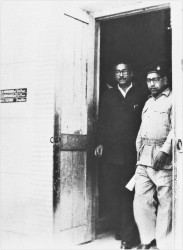 O
O